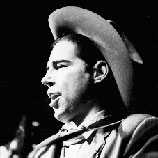Peter La Farge
| Peter LaFarge | |
|---|---|
 Peter LaFarge | |
| Background information | |
| Birth name | Oliver Albee LaFarge |
| Born | April 30, 1931 |
| Origin | United States |
| Died | October 27, 1965 (aged 34) |
| Genres | Folk music |
| Years active | 1962–1965 |
| Labels | Folkways, MGM |
| Notable instruments | |
| Guitar | |
Peter La Farge (born Oliver Albee La Farge, April 30, 1931 - October 27, 1965) was a New York-based folksinger and songwriter of the 1950s and 1960s. He is known best for his affiliations with Bob Dylan and Johnny Cash.
Biography
According to anecdotal sources, he claimed he was distantly descended from the Narragansett Indian tribe and was raised on a ranch in Fountain, CO by his mother Wanden LaFarge Kane. He was the biological son of the Pulitzer Prize winning novelist Oliver La Farge. Oliver and Peter shared a love and respect for the traditions and history of Native Americans. As a teenager he competed as a rodeo rider and worked as a singer. As a young musician he worked with Big Bill Broonzy, Josh White, and Cisco Houston; Houston became La Farge's mentor, in songwriting and in life. La Farge served in the United States Navy during the Korean War. After the war, he worked again as a rodeo cowboy, where an accident nearly cost him a leg.
Following his recuperation, he studied acting at the Goodman Theater School of Drama in Chicago. He then relocated to New York City, where he became increasingly interested in music. As a singer-songwriter, he became well known as a folk music singer in Greenwich Village, along with Bob Dylan, Ramblin' Jack Elliott, Dave Van Ronk, and veteran Pete Seeger. He was contracted briefly with Columbia Records.
At a September, 1962, Carnegie Hall "hootenanny" hosted by Seeger as a means of introducing new talent, Dylan performed a song—which he never recorded -- "As Long as the Grass Shall Grow", with lyrics written by LaFarge and music by Dylan. Its subject was the flooding of the Allegheny Reservoir along the Pennsylvania and New York border, against the wishes of the Seneca Nation of New York, who insisted it violated the Treaty of Canandaigua signed on behalf of the United States by its then president George Washington. The song which immediately followed it was Dylan's epic work "A Hard Rain's A-Gonna Fall", in Dylan's first public performance of that song. LaFarge later wrote, and recorded, his own version of "As Long as the Grass Shall Grow", which was covered by Johnny Cash and others.
His performances in Greenwich Village convinced Folkways Records' initiator Moses Asch to contract La Farge to his music company. La Farge's five Folkways albums (1962–1965) were dedicated to Native American themes as well as blues, cowboy and love songs. His most famous song, "The Ballad of Ira Hayes," is the story of a Pima Indian who became a hero as one of five United States Marines who raised the U.S. flag on Iwo Jima, but who then experienced prejudice and became an alcoholic after his return to civilian life. This song was covered successfully by Johnny Cash in his 1964 album Bitter Tears: Ballads of the American Indian, and reached number 3 on the Billboard country music chart.
During 1965, La Farge was becoming known as an artist and painter. He lived with the Danish singer Inger Nielsen, and the pair had a daughter. Largely as a result of Johnny Cash's success, he was signed to MGM Records and was in the planning stages for a new album. However, he also had serious (and largely undisclosed) medical problems. On October 27, 1965, Peter La Farge was found dead in his New York City apartment. He died from a probable overdose of Thorazine a sleeper Johnny Cash introduced to him at The Bitter End, a club they visited with Ed McCurdy, after meeting in May 1962 at the Carnegie Hall. However, Howard Sounes revealed during 2001 that Liam Clancy had informed him that La Farge had committed suicide by slitting his wrists in the shower stall of his apartment, which was next door to where Clancy was living. Clancy's account conflicts with the police report and the reports in the New York City newspapers, which note that Inger Nielsen found La Farge in their apartment dead from a stroke or overdose. He is buried in Fountain, Colorado and survived by his sister, half brother, daughter and a granddaughter.
Selected discography
- 1962: Iron Mountain and Other Songs
- 1963: As Long as the Grass Shall Grow: Peter La Farge Sings of the Indians
- 1963: Peter La Farge Sings of the Cowboys: Cowboy, Ranch and Rodeo Songs, and Cattle Calls
- 1964: Peter La Farge Sings Women Blues: Peter La Farge Sings Love Songs
- 1965: Peter LaFarge on the Warpath
- 2010: Rare Breed: The Songs of Peter La Farge
See also
References
- CASH - The Autobiography of Johnny Cash - HARPER 2000 - ISBN 978-0-00-274080-7
- The Ballad of Peter LaFarge - 2010 documentary by Sandra Hale Schulman UPC 8-85444-39205-4
- Howard Sounes. Down the Highway: The Life Of Bob Dylan. Doubleday 2001 ISBN 0-552-99929-6
External links
- Peter La Farge biography
- Illustrated Peter La Farge discography
- 'phrase'/ La Farge Discography at Smithsonian Folkways
|